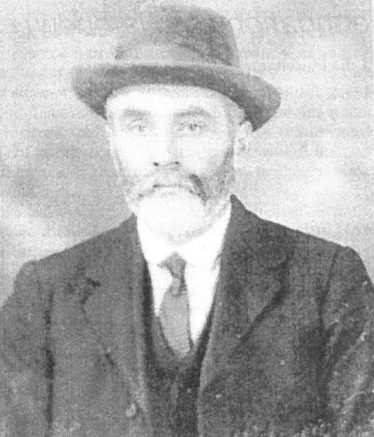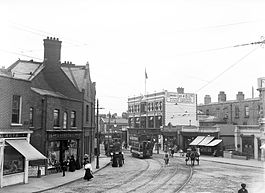
Author Richard Sheane
Richard Sheane was the proprietor of Sheane Brothers & Company, an engineering firm and foundry in Wicklow Town. Born to Richard and Susan Sheane of Coolnakilly, Glenealy in 1871, Richard married Alice Haskins in 1908 and they lived at Morton’s Lane, Wicklow Town with their two children Sydney and Margaret. Richard died in 1955 at the age of 84.
By kind permission of the Wicklow Historical Society – published in Wicklow Historical Society Journal Vol. 3. No.1. 2002.
On The Road North
To-day as arranged with my brother Tom, I started from Wicklow at 6.50 a.m. to drive him and his family North. They met me in Ashford at 7 o’clock, and the route we decided on was through Stillorgan, Terenure, Crumlin, and so round the North West side of the City, so as to get in on the Slane road if possible, as it appeared to be the shortest route.
A short time before I arrived in Ashford, my brother’s party noticed a motor passing the windscreen of which was cracked, and having on board the driver, and one passenger.
We reached Stillorgan in time to meet the same car coming from the direction of the City, it now held two passengers and the driver; they had evidently tried to get through, and had been turned back. They were now travelling round in the same direction as ourselves, and as they took the turn at Stillorgan just in front of us, I noticed that their number indicated that the car hailed from Co. Kerry. We came up on them again at Terenure, enquiring the way, and this was the last we saw of them for some time.
We had expected to get round by Crumlin, and the North of the Phoenix Park, and join the Slane road at Finglas; but at Crumlin we came on a detachment of Cavalry, on their way in from the Curragh. We noticed indications of a skirmish with the rebels near here, and a dead horse lying at the roadside.
‘A Tremendous Cloud Of Dark Smoke’
The soldiers would not allow us to travel in the direction of the Park, and so we had to change our plans, and proceed toward Clondalkin. The road passes over some high ground near Clondalkin, and from here we had a good view of the City and the sight was not at all reassuring; we could see a tremendous cloud of heavy black smoke, rising from the direction of Sackville St., and smaller smoke columns in the direction of Rathmines and Harolds Cross; we could also occasionally hear the reports of big guns, or explosions.
However we had to stop, for a loaded rifle is a great persuader, when you see it pointed straight at your head.
We passed through Lucan, and a couple of miles further on came out on the Navan road, at Clonee; we travelled up this road about four miles, and turned off in the direction of Fairyhouse Race Course, leaving it on our right, and soon after, reaching the village of Rathoath. We passed through here, and on toward Kilmoon, where we found the road closed by a barricade with the police in possession. We were rather surprised to be held up here, so far away from the scenes of conflict, which we had passed by, earlier in the day. However we had to stop, for a loaded rifle is a great persuader, when you see it pointed straight at your head. The barricade was near the foot of a gentle slope, and when we came in sight of it, we saw the car from Co. Kerry, which had passed us in the morning; the occupants were all out in the roadway, apparently parlying with the police, one of whom stepped forward, and signalled us to stop while we were still about thirty yards away. I at once knocked out the clutch, put the gears in neutral, and allowed the car to travel gently toward the barricade, this did not appear to satisfy our friend of the R.I.C. for he now presented his rifle straight at us, and I could see his finger touching the trigger. You may believe me, it did not require my sister-in-laws entreaty, to make me put all my weight on the brake pedal, that the car stopped dead, and I think not much too soon, for the holder of the rifle who now came forward, was in a most excitable, and nervous state. He at once demanded our credentials and wished to be told from whence we came, and whither we went. My brother produced his Inland Revenue Commission, which had a marvellous effect on our questioner, his fears were at once allayed, and he appeared more at his ease. We enquired the reason for all these precautions in this part of the country, and were informed that the rebels had taken Garristown Police Barrack the previous night, and as this place was only two miles away there was cause enough to be on the alert. We were now allowed to pass through, with smiles, and salutations, but not so our friends from Co. Kerry, they were held back, and we saw no more of them.
Very soon after this we entered Drogheda, where we found everything quiet, but had again to produce our credentials to an armed member of the R.I.C. who informed us that trains were running from Drogheda to the North, so here I left my brother and his charges and turned toward home.
On the return journey I met with no incident worth mentioning until I got near the City. From near Clondalkin, I could again see the smoke over the City, and it appeared to be heavier, and to cover a much larger area, than it did in the morning.
I met with perhaps the most exciting incident of any which I experienced during these five days.
After passing through Crumlin, I met with perhaps the most exciting incident of any which I experienced during these five days. I was within about thirty yards of a pretty sharp turn in the road, jogging quietly along at about fifteen miles per hour, slowing slightly for the turn; when suddenly three large Motor Transports, dashed round the corner toward me. They were filled with soldiers, who at once signalled me to stop, and covered me with their rifles. I noticed a man lying on the roof of each, and these men slewed round, and kept me covered, as they passed. And there sat I, with one foot pressing the clutch pedal, and the other the brake, and fervently hoping that no pot holes in the road, would jolt the trigger fingers of those Tommies.
The Off- Duty Soldier
After they got past I could not see more than three feet ahead through the dust which they had raised, and while I waited for it to clear away, an officer ran up beside me from one of the wagons, which had stopped. He enquired if I were going into Rathmines. I replied to the contrary, but that I was going through Terenure, and if I could do anything for him I would go as far in toward Rathmines as possible, but that I understood that if I got right into Rathmines the military would not let me out again. This he informed me was quite correct.

Rathmines c. 1911
He then told me that he was off duty, and had been trying to get to his home in Rathmines for the past three or four hours. He had been fired at three times in Rathmines, and had given up all hope of getting home that night; while wandering round trying to find a way in, he had met this convoy, and decided to turn back with them, as it was not safe by himself where he was. Having heard his story, I told him to come along and I’d drive him as far in through Terenure as I could, but asked him not to take me so far, that I could not get out again; this he was quite satisfied with.
To lessen the risk of his being recognised as a soldier, he removed his cap, and crouched down in the car, I found that he was armed with a revolver and a cane and he had about the dirtiest face that I have ever seen on any man. He told me that through the previous night, and early morning, he had been in charge of a party convoying food and ammunition across to Rathmines, and that he felt nearly done up and he certainly looked it. When we reached Terenure we turned along the tram lines in the direction of the city, and as we passed along he told me that the rebels were here and there in the houses round us. I presume he gave me this information to encourage me; at any rate, it had the effect of making me open the throttle a notch or two wider. Having gone about half a mile in this direction he bade me stop as we had now almost reached the military sentries, and I might have some difficulty to get back if I passed them. Here we parted, wishing each other a safe journey, he into the city, I out to the country.
Wicklow Lacking In Yeast
I reached Wicklow without further adventure, and soon after my arrival there learned that the town and neighbourhood were threatened with a partial bread famine owing to the want of yeast which was usually obtained from Dublin, but these supplies were now cut off, and the nearest available supply appeared to be at Dundalk. To the latter town it was finally decided that Mr. T. J. Haskins, and I should drive on the following day to procure supplies.




No Comments
Add a comment about this page